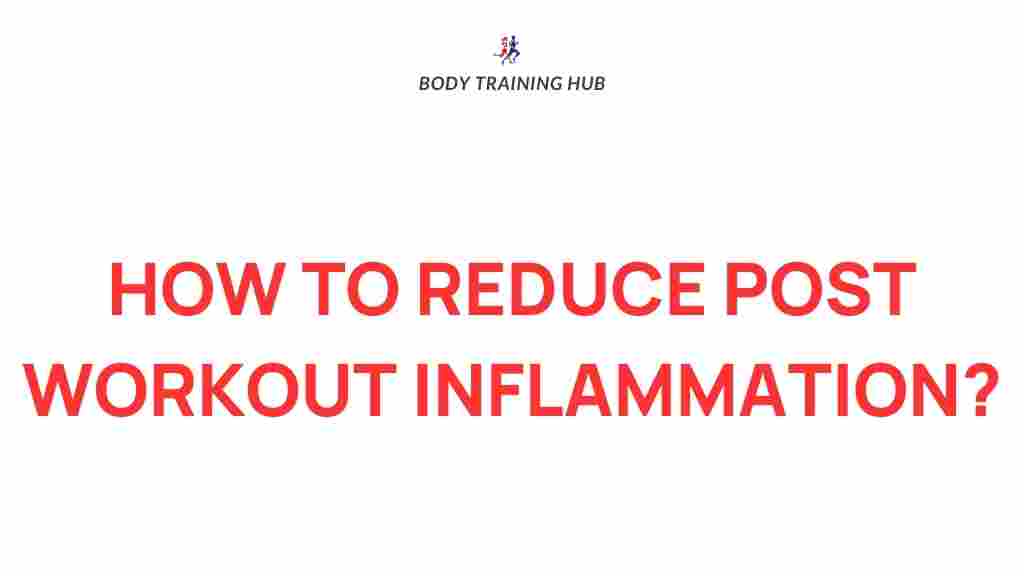Unveiling the Secrets of Post-Workout Recovery
After an intense workout, your body goes through a myriad of changes. The process of recovery is crucial to ensuring that you regain your strength and prepare for your next exercise session. In this article, we will delve into the secrets of post-workout recovery, focusing on inflammation, muscle soreness, and effective recovery strategies. By understanding the importance of recovery, you can enhance your fitness journey and optimize your workout routine.
Understanding Post-Workout Recovery
Post-workout recovery refers to the body’s process of repairing itself after exercise. This phase is essential for muscle repair, glycogen replenishment, and minimizing inflammation. Here are some key components of post-workout recovery:
- Muscle Soreness: Often referred to as delayed onset muscle soreness (DOMS), this sensation occurs when you exert your muscles more than usual.
- Inflammation: A natural response by your body to injury, inflammation can be beneficial but needs to be managed properly.
- Recovery Strategies: Methods to aid recovery can include nutrition, hydration, rest, and active recovery.
Importance of Recovery in Your Workout Routine
Incorporating effective recovery strategies into your workout routine is vital for several reasons:
- Enhances Performance: Adequate recovery allows you to perform better in subsequent workouts.
- Reduces Injury Risk: Proper recovery helps to prevent overuse injuries.
- Improves Muscle Growth: Recovery is when muscle repair and growth occur, leading to increased strength.
Steps to Effective Post-Workout Recovery
To optimize your post-workout recovery, follow these essential steps:
1. Cool Down and Stretch
After your workout, it’s important to cool down gradually. Engage in low-intensity exercises, such as walking or cycling, followed by stretching to help reduce muscle soreness and improve flexibility.
2. Hydrate
Replenishing lost fluids is crucial for recovery. Drink water or an electrolyte-rich beverage to restore hydration levels and support metabolic functions.
3. Refuel with Nutrition
Your body needs the right nutrients to recover effectively. Focus on:
- Protein: Helps repair muscle tissues. Aim for lean sources like chicken, fish, or plant-based proteins.
- Carbohydrates: Essential for replenishing glycogen stores. Include whole grains, fruits, and vegetables in your meals.
- Healthy Fats: Supports cellular function and can help reduce inflammation. Incorporate avocados, nuts, and olive oil.
4. Rest and Sleep
Never underestimate the power of sleep in your recovery process. Aim for 7-9 hours of quality sleep each night, as this is when the body performs most of its repair work.
5. Utilize Active Recovery
Engaging in low-intensity activities such as yoga, swimming, or walking on rest days can promote blood flow and reduce muscle soreness.
Recovery Tips to Minimize Inflammation
Managing inflammation is crucial for effective recovery. Here are some recovery tips:
- Incorporate Anti-Inflammatory Foods: Foods such as berries, fatty fish, and leafy greens can help reduce inflammation in the body.
- Consider Supplements: Omega-3 fatty acids and curcumin may aid in managing inflammation. Always consult a healthcare professional before starting any supplement.
- Cold Therapy: Applying ice packs can help reduce inflammation and numb soreness in the affected areas.
Common Post-Workout Recovery Issues and Troubleshooting
While recovery is essential, you may encounter issues along the way. Here are some common problems and how to troubleshoot them:
1. Persistent Muscle Soreness
If you experience prolonged muscle soreness, consider the following:
- Ensure you are allowing adequate rest between intense workout sessions.
- Reassess your workout routine to prevent overtraining.
- Incorporate proper warm-up and cool-down routines to prepare your muscles.
2. Dehydration Symptoms
If you feel fatigued or dizzy post-exercise, you may be dehydrated. To combat this:
- Increase your fluid intake before, during, and after workouts.
- Monitor your urine color; light yellow is ideal for hydration.
3. Inability to Sleep
If you struggle to sleep after workouts, consider these tips:
- Avoid intense workouts close to bedtime.
- Create a relaxing pre-sleep routine to signal your body it’s time to wind down.
Conclusion: Embrace the Recovery Process
In conclusion, post-workout recovery is a critical aspect of any fitness journey. By implementing effective recovery strategies, you can reduce inflammation, minimize muscle soreness, and enhance your overall performance. Prioritize your recovery just as much as your workout routine, and you’ll reap the benefits in the long run. For further reading on fitness and recovery, check out this comprehensive guide on exercise recovery techniques.
Remember, the journey to fitness is not just about pushing your limits but also about knowing when to rest and recover. Embrace these strategies and watch your performance soar!
This article is in the category Strength & Recovery and created by BodyTraining Team
